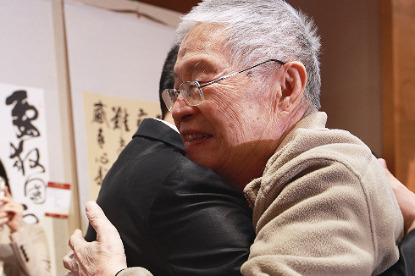Insomnia, depression treatment a click away

A digital-based therapy using a mobile application with recording and analytic functions can relieve symptoms of insomnia and depression among people age 15 to 25, according to a team of scientists from the Chinese mainland and Hong Kong.
Researchers from the Chinese University of Hong Kong's Faculty of Medicine and Peking University Sixth Hospital hope the innovative app-based therapy will appeal to young people who are at high risk for depression but less receptive to traditional treatments.
The insight comes amid growing concerns over mental health issues among young people. According to the World Health Organization's Global Burden of Disease 2021, 3.5 percent of people age 15 to 19 experience depression. Mental health research by CUHK in 2023 found that 3.9 to 5.2 percent of young Hong Kong residents suffered from depression.
At a news conference on Thursday, scientists involved in the project revealed the results of clinical research on a "digitalized intervention application" offering cognitive behavioral therapy for insomnia. Traditional CBT-I treatment involves six to eight face-to-face sessions with a trained provider who examines, identifies and reframes thoughts, feelings and behaviors related to poor sleep.
The joint research, conducted by CUHK and PKU, recruited 708 people from 15 to 25 years old from the mainland and Hong Kong, all of whom had insomnia with symptoms of subclinical depression. Half of them received a six-week digital CBT-I treatment via a phone app, while the other half received general health education.
The digital CBT-I program used in the study presented participants with courses and matched practices over six weekly stages, aligning with conventional CBT-I treatment. It covered areas such as sleep restriction, stimulus control, cognitive restructuring and relapse prevention, said Chen Si-jing, a postdoctoral fellow at CUHK's Faculty of Medicine and first author of the research.
The insomnia remission rate for those who received digital-based therapy was 60 percent, according to a one-year follow-up. The rate of depression incidence was about 10 percent, significantly lower than the 18 percent in the control group, the researchers said.
Eighty-four percent of those in the e-CBT-I treatment group completed all the sessions, showing strong motivation among young people to address insomnia — a problem that can significantly increase the risk of depression, Chen added.
The promising results have been published in international medical journals, aiming to pave the way for developing digital self-help treatments that are more readily embraced by the digital native generation, a term referring to people born after 1979.
"These findings highlight the importance of developing digital mental health therapeutics to meet significant clinical demand," said Wing Yun-kwok, chairman of the Department of Psychiatry at CU Faculty of Medicine.
CBT-I has long been recognized as an effective therapy for adults, and the research unveils its potential for younger people, said Lu Lin, academician of the Chinese Academy of Sciences and president of Peking University Sixth Hospital. But Liu added that there are barriers that need to be removed.
"For instance, a community-based study indicates that the help-seeking rate of young insomnia patients on the Chinese mainland and in Hong Kong is as low as 10 percent," Lu said. "CBT-I is typically conducted by medical professionals throughout, making it a time-consuming and costly process that limits accessibility for youths."
Wing expressed optimism about further exploration of innovative treatments for insomnia and depression, aiming to advance personalized prevention and early intervention for young people.
- China launches new communication technology test satellite
- Portuguese-speaking media visit Mixue headquarters in Zhengzhou
- Duo fined for damaging grassland at Xinjiang landmark
- Chinese biotech firms unveil advanced human-centric genomic model
- China delivers 1st dual-fuel luxury Ro-Ro vessel GNV·VIRGO
- Nyingchi's breathtaking autumn charm





































